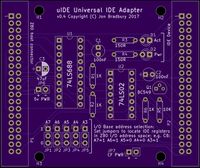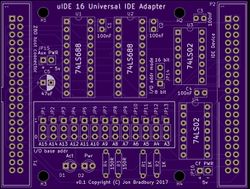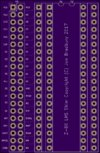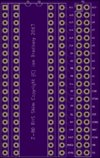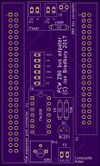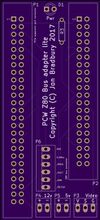About the uIDE project
The uIDE concept is not terribly new (search for GIDE). The idea was to produce a low cost IDE adapter, suitable for connecting to Z-80 computers via a shim board that fits between a (socketed) Z-80 and its main board socket. From the shim, a 40 way IDC cable is connected to the uIDE adapter board, then a CF card or DOM plugs into the other end (if there is space inside your Z-80 computer, you may be able to connect the shim and uIDE cards directly together without a cable). uIDE cards are "universal" because their I/O base address is fully configurable via a row of 2 position jumpers on the board.
Once the hardware is installed, drivers need to be written (see below).
uIDE 16 can be configured for use on any Z-80 microcomputer such as the CPC range of computers. It is called "uIDE-16" because it decodes all 16 address bus lines to provide access to the IDE ATA registers as is required by the Amstrad CPC machines.
uIDE-8 is a similar design that just decodes the low 8 bits of the Z-80 adddress bus, and this can be used on the PCW and most other Z80 machines. uIDE-16 has a user-configurable 8-bit mode that allows it to work with 8-bit addressed I/O. In this mode, some components (U1 and its socket and smoothing capacitor) may be left out of the board. However, uIDE-8 is slightly smaller and cheaper than uIDE-16.
Project status
As of now (Early Feb 2017) uIDE-16 is in the design phase, but the board has been laid out. Click the image above for a closer look.
The first batch of uIDE-8 boards has been ordered.
Feature list
- Compact design, only 4 ICs (uIDE-16) or 2 ICs (uIDE-8) and a smattering of discreet components. Board measures 79x60mm (uIDE-16).
- Can be connected to the PCW expansion port (see below) or internally via a Z80 shim card (note, this requires a socketed Z80).
- Driver supports Amstrad CP/M Plus only at this time (it is implemented as a FID).
- A separate driver exists for Lifeboat CP/M 2.2 on the TRS-80 Model II that can be ported to other CP/M 2.2 variants.
- The CP/M driver runs the IDE device in LBA / 8 bit mode, so DOMs or CF cards are recommended (up to 128MB).
- Fully programmable I/O address decoding (via on-board jumpers). Initial I/O range (for the CPC driver) is FEF0-FEF7, but you can change this to suit your own hardware / driver.
- Can be used on any other Z80 computer with a socketed processor.
- Implemets a standard bus connector that exactly matches the Z80 pinout. Further expansions are planned, including a Z80 bus board.
Z80 Shims
These small cards are inserted between the Z80 and its socket, and present all 40 pins of the CPU via a 40 way header. This header is the "Z80 Bus" that the uIDE cards connect to.
Choose the one that fits best inside your machine. A CPC6128 needs the left hand shim, although space is very tight under the keyboard (the processor sits directly behind the expansion port) and it's not known yet whether it will fit. PCW machines have more space, so either shim should fit.
Machine-specific expansion port adapters
Use one of these cards if you prefer to connect your uIDE card to the machine's expansion port rather than via its Z80 socket.
PCW
These cards allow connection of a uIDE card to the 50 way expansion port on the back of the machine. They are designed to support the PCW edge connector type port, but the European Centronics type port might be accommodated if a suitable connector exists (50 way Centronics, 2.54 header pitch). In addition they provide access to the PCW's 5v and 12v power supply, as well as other signals from the card edge connector. One variant has a small composite video circuit so that you can connect an external monitor to the PCW.
CPC6128
Not designed yet... but watch this space!
